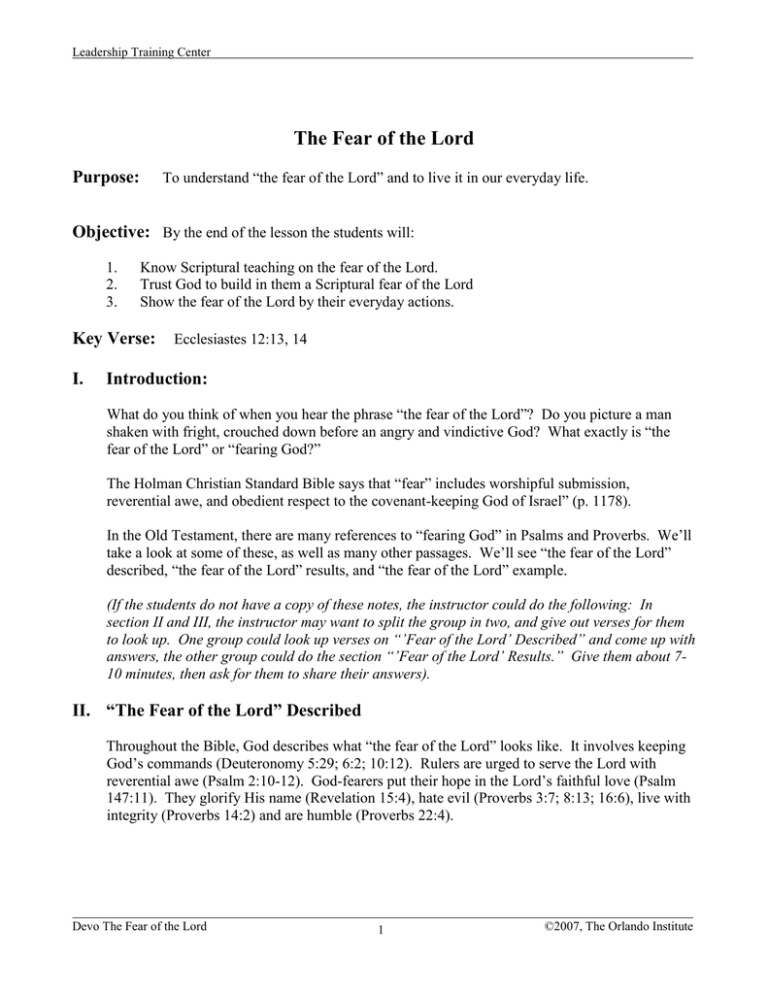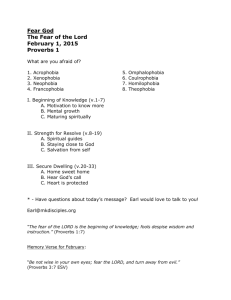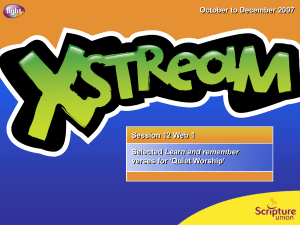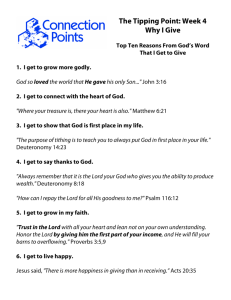The Fear of the Lord Purpose: Objective:
advertisement

Leadership Training Center The Fear of the Lord To understand “the fear of the Lord” and to live it in our everyday life. Purpose: Objective: By the end of the lesson the students will: 1. 2. 3. Know Scriptural teaching on the fear of the Lord. Trust God to build in them a Scriptural fear of the Lord Show the fear of the Lord by their everyday actions. Key Verse: I. Ecclesiastes 12:13, 14 Introduction: What do you think of when you hear the phrase “the fear of the Lord”? Do you picture a man shaken with fright, crouched down before an angry and vindictive God? What exactly is “the fear of the Lord” or “fearing God?” The Holman Christian Standard Bible says that “fear” includes worshipful submission, reverential awe, and obedient respect to the covenant-keeping God of Israel” (p. 1178). In the Old Testament, there are many references to “fearing God” in Psalms and Proverbs. We’ll take a look at some of these, as well as many other passages. We’ll see “the fear of the Lord” described, “the fear of the Lord” results, and “the fear of the Lord” example. (If the students do not have a copy of these notes, the instructor could do the following: In section II and III, the instructor may want to split the group in two, and give out verses for them to look up. One group could look up verses on “’Fear of the Lord’ Described” and come up with answers, the other group could do the section “’Fear of the Lord’ Results.” Give them about 710 minutes, then ask for them to share their answers). II. “The Fear of the Lord” Described Throughout the Bible, God describes what “the fear of the Lord” looks like. It involves keeping God’s commands (Deuteronomy 5:29; 6:2; 10:12). Rulers are urged to serve the Lord with reverential awe (Psalm 2:10-12). God-fearers put their hope in the Lord’s faithful love (Psalm 147:11). They glorify His name (Revelation 15:4), hate evil (Proverbs 3:7; 8:13; 16:6), live with integrity (Proverbs 14:2) and are humble (Proverbs 22:4). Devo The Fear of the Lord 1 ©2007, The Orlando Institute Leadership Training Center III. “The Fear of the Lord” Results The fear of the Lord is the beginning of knowledge, wisdom, and understanding (Proverbs 1:7; 9:10; Psalm 111:10). God’s guidance will be available to them (Psalm 25:12). Great goodness is stored up for them (Psalm 31:19). God’s eye is upon them (Psalm 33:18). The angel of the Lord encamps around them and rescues them (Psalm 34:7, 9). Great faithful love is toward those who fear God (Psalm 103:11, 17). They experience God’s fatherly compassion (Psalm 103:13). Food will be provided (Psalm 111:5). They are valued by God (Psalm 147:11). Fearing God can prolong one’s life (Proverbs 10:27). God’s mercy is from generation to generation on those who fear Him (Luke 1:50). There are heavenly rewards (Revelation 11:18). Women who fear God will be praised (Proverbs 31:30). The fear of the Lord is a fountain of life, gives one strong confidence and their children have a refuge (Proverbs 14:26, 27). By the fear of the Lord, one turns from evil (Proverbs 16:6). Fearing God can lead to life and a secure night’s sleep (Proverbs 19:23). God-fearers have a future and their hope will never fade (Proverbs 23:17, 18). Those who are always reverent are happy (Proverbs 28:14). (A couple of chapters in Psalms are all about the fear of the Lord – what it looks like, and benefits. Perhaps half the students could look up Psalm 112 and the other half look up Psalm 128 and, as a group, they can note how “the fear of the Lord” is described, and results of “the fear of the Lord.” Give them about 5-7 minutes for each group, then ask for their results.) IV. “The Fear of the Lord” Exemplified A. Joseph in Egypt In Genesis 42:18, Joseph spoke with authority to his brothers, “I fear God – do this and live...” I’m sure that statement was relief to his brothers since he could have spoken the word and they would have been dead. I’m also confident Joseph’s words were motivational for them to obey what he said. (Ask the students to read Genesis 39, and note how many ways Joseph showed by his life that he really did fear God. Give about 5 minutes, then ask some to share what they found. If not mentioned, you could say...) In Potiphar’s house, the Lord blessed Joseph. As a result, he was successful in his service and put in charge of all things. When being seduced by Potiphar’s wife, he’s an example of what God-fearing men need to do – avoid her if you can, and if necessary, RUN! As an innocent prisoner, the Lord blessed him so that everything Joseph did was successful. Joseph was a slave or prisoner for perhaps 13 years! He could have pitied himself and accomplished only the work that was required of him and no more. Even when he stood before Pharoah to interpret the dreams, he could have laughed at Pharoah and said, “You’re going to die, and I don’t care because I’ve been a prisoner in this foreign land for 13 years, and I’m glad that God’s justice is coming!” Instead, he was diplomatic, faithful, caring, and even offered advice so that thousands could be rescued. Devo The Fear of the Lord 2 ©2007, The Orlando Institute Leadership Training Center B. Hebrew midwives in Egypt (Ask the students to read Exodus 1:15-21, and comment on how the midwives feared God and the results of this. Give about 2 minutes, then ask some to share their answers. If not mentioned, you could say...) The Hebrew midwives feared God and therefore disobeyed Pharoah and let the Hebrew boys live. They even gave a mediocre excuse for not carrying out Pharoah’s command. God was good to the midwives and gave them families. V. Conclusion In the book of Ecclesiastes, King Solomon described his search for meaning and purpose in life. In the end, he concluded “When all has been heard, the conclusion of the matter is: fear God and keep His commands, because this is for all humanity. For God will bring every act to judgment, including every hidden thing, whether good or evil” (Ecclesiastes 12:13, 14). Perhaps the Hebrew midwives and Joseph had this in mind, that they will have to stand before God and give an account of why they did what they did, said what they said, and thought what they thought. Perhaps this is what fearing God is all about. God-fearers do what is in section II (keep God’s commands, glorify His name, hate evil, etc.) because they know they will stand before God and give an account of everything in their lives (Proverbs 5:21; Psalm 119:168; Hebrews 4:13). Jesus said we will give an account for every careless word we speak (Matthew 12:36, 37). A word sometimes used to replace “fear” is “respect.” We are to fear and respect God as we do our parents. (We are to respect the one in authority over us who also loves us and calls us to give an account for the behavior we have exhibited.) The love of the one in authority over us may sometimes involve discipline – which hurts – but is needed (Hebrews 12:5-11). Do you fear God, and show it by your words, actions, and thoughts? Do you live your life knowing you will have to give an account to God for everything you do, say or think? Fearing God may be challenging at times, but it has its rewards – both now and in eternity! May it be obvious to all that you are a man or woman who fears God. “Let those who fear the Lord say, ‘His faithful love endures forever.’” Psalm 118:4 “The fear of the Lord is wisdom’s instruction...” Proverbs 15:33 (Close in prayer) Devo The Fear of the Lord 3 ©2007, The Orlando Institute








